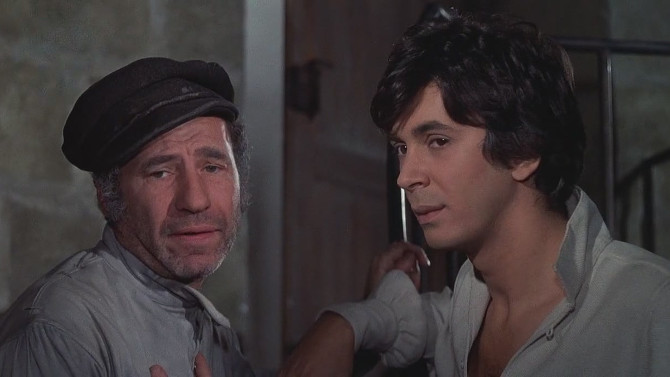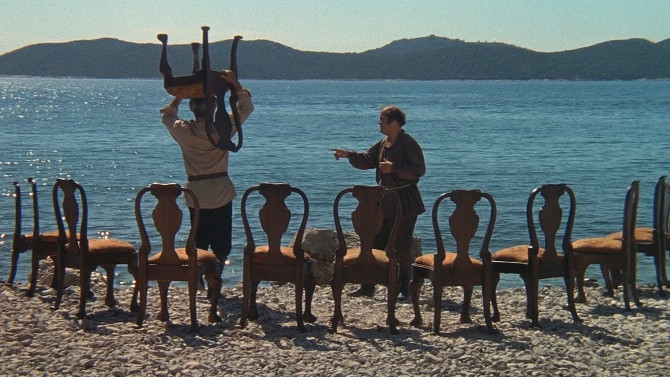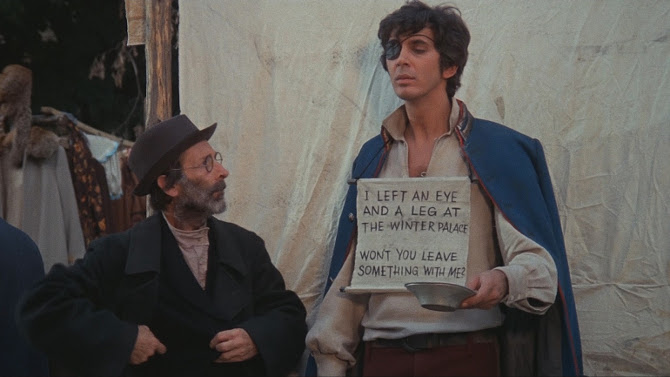A slick con artist, an unscrupulous priest and a ruined aristocrat walk into a house. . . sounds like a joke; it kind of is – for this is the lead-in to Mel Brooks’ 1970 comedy The Twelve Chairs.
Loosely based on the 1928 Russian novel of the same name (written by Ilf and Petrov), this film is arguably the black sheep of Brooks’ filmography, a more artsy piece that is less laugh out loud funny, and instead, more of a thinking man’s funny – for instance, as a character wanders the Soviet streets at the beginning of the film (set in 1927), he passes two different street signs, the original: “Czar Nicholas II Avenue”; the new one, “Marx, Engels, Lenin & Trotsky Street – with a line running through the final name” – if you know your history, Nicholas and his family were executed during the Russian Revolution of 1917, while the name Trotsky has been eliminated, as in the very year this story is set, Joseph Stalin ran him out of the country and into exile – in 1940, Stalin would have him killed in Mexico City by way of an ice axe (I almost had a really good ice pun for this, but it slipped my mind). . . fear not, Brooks works some cheesy humour into the story as well.
The ruined aristocrat, Vorobyaninov (Ron Moody), had to flee with his family after the fall of the Tsarist-run country. . . now his dying mother-in-law has called him to see her on her deathbed. Before he arrives, the unscrupulous priest, Father Fyodor (Dom DeLuise), hears her confession – and she reveals that she hid all of the family’s jewellery in one of their twelve dining room chairs at their old mansion. Father Fyodor leaves hurriedly. . . for obvious reasons; Vorobyaninov soon arrives and learns of the hidden fortune himself, joining the frantic rat race. While en route, he meets slick con man Ostap Bender (Frank Langella) – a quick-on-his-feet scam artist who latches onto the rather dim-witted former aristocrat.
Learning where the chairs have been taken from Vorobyaninov’s former servant, Tikon (Mel Brooks) – a man so in love with his past life and master, he cherishes the small beatings the man gives him (probably the funniest part of the film). . . this information leads to an across Russia chase to track down these stunning gems. But who will gain the upper hand? Is Bender an honest scammer? Are the jewels even in one of the chairs anymore?
Though much of this film revolves around treachery, there is also a strong story about friendship and finding kinship in places wholly unexpected. Though Vorobyaninov and Bender’s bond is anything but conventional, there is a surprising amount of heart to it – and the film’s ending may surprise some viewers with its genuine honesty and realness.
As for the laughs, there is some physical comedy that resembles a Benny Hill-type chase, while you will also hear some clever dialogue (the let’s talk about ‘things’ banter is right up there), but perhaps most impressive is for those eagle eyed viewers (and lovers of history), for, like the street signs mentioned above, there are numerous times where gags can be seen somewhere in the shot. Case in point, when Bender sneakily enters the Bureau of Housing to learn of where the chairs have been dispatched to, a giant sign reads, “THINK TWICE BEFORE KNOCKING ON ANY OF THESE DOORS! YOU ARE DISTURBING VERY BUSY PEOPLE!” – perhaps a slight exaggeration (Communism, anyone?!), and, as he makes his way down the hallway, he passes the Bureau of Bureaus and Dressers. . . and, at the end of the hall, the Bureau of Furniture Not Listed in Other Bureaus. When he finally does make his way to the Bureau of Chairs, a sign reads, “STATE YOUR BUSINESS AND LEAVE!” – a nice jab at those oh-so-friendly government paper pushers, while another warning states, “DON’T WASTE PAPER!” – ironic, since the room is jam packed with documents. And, perhaps my favourite, a comedy troupe is putting on a play entitled, ‘The Rise and Fall of the Upper Classes – A Comic Spectacle!’ – only in Soviet Union Russia could this be construed as a comedy.
Originally to have starred Alistair Sim, Peter Sellers, and Albert Finney, this could have been a very different movie – yet, despite some unBrooks-like qualities (who expects to see stunning Lawrence of Arabia-style extreme long shots of the characters meandering through the Russian wilderness in a comedy?), The Twelve Chairs merits a watch for its fine performances, intriguing take on Soviet-era Russia, and a smattering of comedy along the way. Two final things worth noting – the theme song (which is also the title of this review) was written by Mel Brooks, while a line late in the film (that relates to the finding of the so desired fortune) utilizes the name Kaminsky – Brooks’ real last name. No need to feign any affliction here, Brooks’ second directorial effort (after the much more famous The Producers) is, may I say, a hidden gem.



